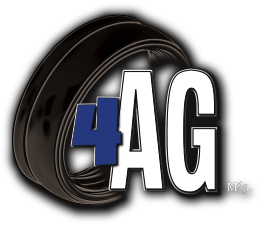How to Optimize Planting Efficiency with Gauge Wheel Tires?
Understanding why gauge wheels are essential is vital to planting just right in farming. These small parts have a big job—they help control how deep seeds go into the ground, ensure the soil covers them adequately, and the seeds get enough contact with the soil to grow well. Farmers can choose the best gauge wheel tire for their planting tools and its conditions by knowing why gauge wheels matter. This helps them plant efficiently, improves how well seeds sprout, and boosts crop yields. So, scroll down to learn more about gauge wheel tires for planters.
What Factors Contribute to Selecting the Best Gauge Wheel Tire?
The seed opener and gauge wheel work together to dig a trench at the proper depth for planting seeds. They also ensure enough soil is left to cover the seeds adequately. Picking the right gauge wheels depends on what kind of planter you have, how wet the soil is, the tillage practices you use, and the crop you're planting. All these factors help decide the best gauge wheel tire that will do the job of planting your seeds flawlessly.
How Optimal Placement of Gauge Wheels Helps in Successful Planting?
Strategic Placement for Precision
Gauge wheels are typically positioned beside the seed opener blade, ensuring optimal depth control during planting. This location, closest to where seeds drop, allows for precise depth adjustment, directly influencing seed-soil contact and germination efficiency, which is critical for successful crop establishment.
Soil Preservation in No-Till Systems
The proximity of the gauge wheel to the opener blade prevents soil ejection from the furrow, which is crucial for minimizing soil disruption in no-till farming. Maintaining soil integrity aids in preserving soil structure and fertility, supporting sustainable agricultural practices and long-term soil health. Choosing the best gauge wheel tire enhances soil conservation efforts effectively.
Effective Furrow Closure
Placement alongside the blade facilitates proper furrow closure post-seeding. Preventing excessive soil displacement enables the gauge wheel tire to replace soil effectively, ensuring optimal seed coverage and protection. This contributes to uniform germination and promotes healthy crop development.
Mitigating Waterlogging Risks
By avoiding excessive soil movement, gauge wheel placement helps prevent waterlogging in fields prone to saturation. Minimizing soil disturbance reduces the formation of surface depressions that trap water, mitigating the risk of seed rot and promoting favorable crop growth conditions.
How Can Gauge Wheel Design Impact Soil Compaction and Crop Yield?
The gauge wheel's primary function is to hold down the sidewall of the furrow during planting, ensuring precise seed placement and effective closure.
However, this process can lead to sidewall compaction, causing problems such as restricted poor emergence, reduced yield potential, and root growth.
Certain manufacturers have addressed gauge wheel challenges through design modifications to their equipment.
The best gauge wheel tire system may feature a Reduced Inner Diameter (RID) tire with a distinct relief profile.
This design allows space for soil to bump upward along the furrow's edge while maintaining a clean furrow profile.
The system is complemented by a 'seed boot' inside the furrow, preventing loose soil from collapsing inward before seed placement.
Choosing the gauge wheel tire with features like RID can help mitigate sidewall compaction issues and optimize seed-to-soil contact for improved crop performance.
What Factors Determine the Best Width for Gauge Wheels in Planting Systems?
Gauge wheels are offered in widths ranging from 2.5 inches, 3 inches, and 4.5 inches, with 4.5 inches being standard, and the choice depends on depth requirements and soil compaction concerns.
Narrower wheels, such as 2.5-inch ones, prioritize depth by minimizing obstruction by debris or soil clumps.
In twin-row planters, 2.5-inch wheels are preferred due to space limitations.
For strip or ridge till systems, 3-inch wheels balance depth and compaction and are increasingly favored in no-till systems for smooth navigation through debris.
Cultivator Gauge wheel tires over 4 inches in diameter are commonly used in conventional tillage systems and are also suitable for heavy soils prone to plugging issues in no-till systems.
Selecting the best gauge wheel tire ensures optimal depth control and minimal soil compaction based on specific planting requirements and conditions.
How Do You Choose Between Spoked and Solid Gauge Wheels in Farming?
Cultivator gauge wheels are offered in solid and spoked profiles, providing adaptability to soil conditions, farming methods, and individual preferences.
Spoked wheels permit residue and mud to pass between the spokes, averting blockages and simplifying debris removal. Nonetheless, in no-till systems like corn fields, stalks and debris might entangle within the spokes, leading farmers, especially those in drier regions, to favor solid wheel configurations.
Which Gauge Wheel Tire Is Best Suited for Farming Needs?
Gauge wheel tires typically feature a convex profile to reduce drag and improve agronomic efficiency.
Traditional rubber tires offer flexibility, aiding in the easy shedding of mud and debris during operation.
However, rubber tires often struggle to withstand the extreme wear encountered in conservation tillage systems, especially in no-till farming, where corn stalks can cause significant damage.
Polyurethane tires are gaining popularity as the best gauge wheel tire choice due to their superior durability, retaining their shape for improved furrow performance.
Despite their advantages, polyurethane tires may be heavier and more complex, potentially leading to increased soil compaction and uneven depth if the tire bounces on uneven terrain.
Additionally, polyurethane tires may be prone to mud plugging as they do not shed mud as quickly as rubber tires.
Upgrade Your Planting Efficiency with Top-Quality Gauge Wheels in Town!
For innovative solutions in planting equipment, turn to 4AG Manufacturing. Our expertise in gauge wheel planter tires ensures optimal performance for your farming needs. Discover how we have the best gauge wheel tire solution, allowing for precise seed placement and improved furrow profile. Contact us today to elevate your planting efficiency and crop yield with our cutting-edge products.

